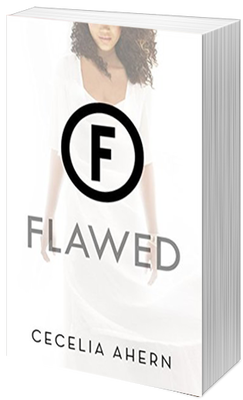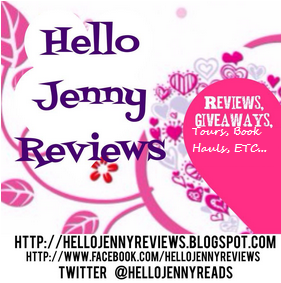Flawed is one of those books that you really enjoy but have some serious qualms. Find my review also on Goodreads.
Firstly, the concept of a separation between a moral/ethical system and the criminal justice system is a new idea to me, and it was a difficult to accept. Morals/ethics are the foundation on which a justice system sits, because they determine what is wrong, illegal, a crime. However, separate the morals/ethics from the justice system and...it no longer makes sense, lacking substance and a driving force. And the society in this book struggles with the separation--it isn't necessary illegal to be Flawed (a person found guilty of a moral/ethical failure in judgment/character), but you are brought before a Guild, your "flaws" listed and discussed publicly, and then a sentence announced of whether you are not guilty (has happened only once as far as protagonist Celestine knows of) or guilty of the Flawed accusation. If determined Flawed, an individual is branded with an 'F' on the place of their body representing the flaws they were found guilty of--temple for poor judgment, chest for disloyalty to society, hand for theft, tongue for lying, foot for walking away from society (think The Scarlet Letter). In Celestine's case, she receives a sixth brand along with the other five, because Crevan (awful man, a judge on the Guild and his ancestor was a founder of the Flawed ideology) said she was Flawed to the bone and needed a brand to remind her and punish her further. As we find out throughout the remainder of the book, this disparity in the systems and how they are failing society are coming to life. Celestine's trial after helping an ill and elderly Flawed man to a seat he was not permitted to occupy (think Jim Crow/Segregation/Apartheid laws) was the eruption of a revolution that had been steeping for a while. Society was slowly crumpling--Flawed people were no longer guaranteed safety or basic human rights. There were terrorist attacks against Flawed individuals (Celestine experiences one such event). Not even law enforcement, those enforcing the criminal justice system and keeping ALL Flawed and non-Flawed individuals safe, was able to distinguish between right and wrong because of the failures in the system. Even though this started off as what I thought a plot hole, it turned into the heart of what the plot was--this is a broken, corrupt system that underground individuals are trying to change/destroy, and I can totally get behind it being intentional like this.
Now, unlike the above issue that resolved itself for me, Celestine's character did not have the same effect. By the time I was about halfway through the book I was fed up with her. She is that quintessential intelligent teenage good-girl-found-bad, now struggling with her identity but still thinking that she knows everything and has the best solutions to her problems.
-My first problem with her: her relationship with Art was cute at first, but the library scene with him after she returned to school from the trial was rather telling of how shallow their relationship truly was. If he had known her so well, he would not have reacted the way he did to the birthday invite, and he sure as hell wouldn't have suggested she didn't understand what he had been through trying to stay away from his father because of his love for her. Um, no--boi, ya don't know what she's been through, so stahp.
-Problem two: mysterious Flawed At Birth boy Carrick, who she never officially met or had a conversation with or...anything. They shared a few meaningful expressions with each other and a little time together outside, and that is it. Yet Celestine just can't stop thinking about him, how he understands her, that she can't stop wondering what happened to him and his promise from when she was being branded: "I will find you." She has feelings for him, feels guilty because she stills wants Art, worries about him, wonders where he has been hiding and if he is safe...yet this Carrick keeps coming back to her. The extent to which she discusses their existing non-existent relationship is eye roll worthy--I may have sprained my eyes, BTW. Let me give you a taste of my notes as I read. Page 117: "Okay...shut up. You seriously do not have some amazing connection to this guy. You are distraught and in a terrible position and are latching onto anyone you can." Cecelia attempted to liken Carrick's and Celestine's experience to that of people who had braved the elements while lost in the mountains...but the difference and reason the situation in the book failed to work for me is that the example I gave was life or death and those individuals had to work together/communicate/build trust in order to develop that deep relationship. Carrick and Celestine experience none of that except for proximity within the holding cells and him witnessing her abuse within the Branding chamber and him saving her after the grocery store incident (not to mention their relationship is totally one-sided, him doing stuff for her and her floundering to find him while under restrictions). Their relationship is forced to the extreme, and I'm really not sure their relationship can be redeemed for me in the sequel.
Last problem: Celestine is logical and smart, so much so that she put aside what society asked of her and helped a man on a bus (unfortunately a Flawed man). However, she sure does an awful lot of being unrealistically wishy-washy in her emotions. The moment I felt her emotions were most out of place was when she was kidnapped. She was terrified, mortified, disgusted in herself and the power her kidnappers had over her. They stripped her down, took pictures of her. She was a mess, crying, feeling hopeless, expecting the worst. Her captors then spotted the sixth unrecorded and unheard of brand and get spooked--and the slight change in tension, them showing a little fear toward her, and she suddenly feels this immense power and bad-assery in response to her discomfort. That switch in emotion is understandable, but where a slight feeling of empowerment would have been where she probably stood (around a 4 or 5 on the scale), she actually expresses an extreme high (like a 9 or 10). That huge jump between her extreme low in fear and uncertainty to the extreme high of surety and confidence in power they gave her...I can't get behind that at all. There are several other moments like this that leave an unsatisfactory emotional impression, but one is enough to give you an example.
I do have the pleasure of reading the sequel, Perfect, right away thanks to NetGalley. I'll be posting the review for that one once I finish. It might be a week or so. I'm a tad burnt out from reading a lot the past couple weeks, planning a California trip, and buying/moving into my first home, so I will get there eventually--promise!
A quick explanation of why I gave Flawed 4/5 stars. Even as much as Celestine's character angered me, her thoughts and actions were very relatable, her family dynamics honest, and her realization that this society's reliance on the Flawed system being corrupt and wrong is admirable and strong and right. Not to mention, the idea of society as a whole doling out the punishments for ethical/moral failures is not a new concept, but Cecelia has brought new life to it, and this new life is well done.
If you liked The Scarlet Letter or When She Woke, this book is for you. Warning though:The Scarlet Letter is a classic and When She Woke is an somewhat graphic adult fiction.


















0 comments:
Post a Comment